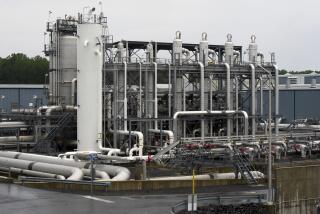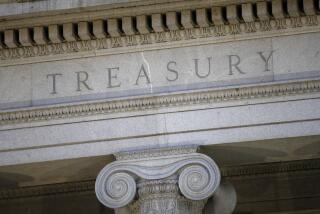Clinton to Ban New Myanmar Deals, Aides Say
Under mounting pressure from Congress and human rights advocates, President Clinton has decided to ban new U.S. investment in the troubled Southeast Asian nation of Myanmar, several White House officials confirmed Monday night.
“It just reached the point where it was time to send a message,” one Clinton administration official said, adding that previous sanctions did not appear to have an impact on “continuing repression” by the strong-willed generals who seized control of the country in 1988.
The long-anticipated White House decision will be announced today by Secretary of State Madeleine Albright, one White House official said. The prohibitions mark a huge blow to the U.S. firms that lobbied against them, led by El Segundo energy giant Unocal Corp., the top U.S. investor in the country, formerly known as Burma.
Barry Lane, a Unocal Corp. spokesman, said late Monday that the company had not been officially notified of the White House action but “would be disappointed if they chose to implement sanctions.”
The company and other U.S. investors in Myanmar, including Arco and Texaco, have fought the imposition of tougher economic sanctions against Myanmar’s military rulers, arguing that “economic engagement” and not isolation is the way to bring freedom and democracy to such countries.
But those U.S. investments have come under harsh criticism in Congress and elsewhere in recent months as the political and human rights situation in Myanmar continued to deteriorate.
Since last fall, Nobel Peace Prize winner and opposition leader Aung San Suu Kyi has been detained in her home in the capital, Yangon, and more than a dozen opposition politicians have been kidnapped, with one killed.
Clinton made his decision days before a bipartisan group in Congress, led by Sen. Mitch McConnell (R-Ky.), is expected to introduce a bill that would force the U.S. government to cut off new investment into Myanmar.
McConnell predicted such a ban would cripple the $1.2-billion Yadana pipeline, a joint project between Unocal, French energy company Total, Myanma Oil & Gas Enterprise and a Thai company.
Last week, Unocal President John Imle said a ban would harm his company’s plans for “new investments” in energy-rich Myanmar, which is a crucial link in the company’s Asia strategy.
Unocal general counsel Dennis Codon said Monday that he did not believe the sanction, if modeled after a sanctions law passed last year, would “have a material impact on the [pipeline] project.”
That law authorized the president to impose further sanctions against Myanmar, including a new investment ban, if “widespread repression” occurred.
Human rights advocates were pleased that Clinton is going to use the toughest weapon left in the U.S. foreign policy arsenal. The government has already cut off bilateral and multilateral aid to Myanmar and banned visas for officials of that country’s ruling State Law and Order Restoration Council.
Mike Jendrzejcyk, a spokesman for Human Rights Watch Asia in Washington, expressed hope that the U.S. action would lead other countries to follow suit, further isolating Myanmar’s leaders. The European Union recently suspended $50 million in trade benefits to Myanmar, and Canada’s government is debating cutting off imports from Myanmar.
But Jendrzejcyk expressed disappointment that the White House did not move sooner to impose the sanctions.
Times staff writers Vicki Kemper and Norman Kempster in Washington contributed to this report.
More to Read
Sign up for Essential California
The most important California stories and recommendations in your inbox every morning.
You may occasionally receive promotional content from the Los Angeles Times.










